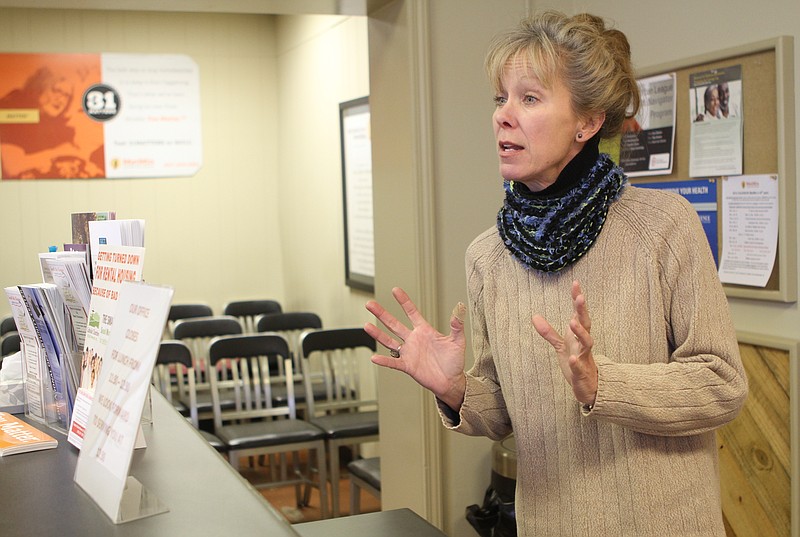We cannot succeed as a community with extraordinary wealth at one extreme and deep poverty at the other.
- Chattanooga Mayor Andy Berke, 2017
Three mornings a week, folks line up in the McCallie Avenue dark, waiting outside Metropolitan Ministries, hoping for help: a water bill paid, help with rent, an EPB account reconnected.
But this summer, more and more folks have been asking for help with sewer bills.
Past-due sewer bills.
Really, really past due.
"Here's one for $1,343," MetMin director Becky Whelchel said. "And another for $1,628."
Another past-due bill for $1,086.
Another: $1,197.
Another: $920.
All past due, mounded up after months, or years, of not paying or underpaying.
Since January, MetMin has paid $14,000 in sewer bill help; the agency is at the forefront of what appears to be a sewer bill crisis for hundreds, if not thousands, of Chattanoogans.
The city has 70,000 active sewer customers.
Of those, 989 - nearly all residential - have past-due accounts each totaling more than $1,000.
Of those, 74 customers owe more than $2,000.
All together, those 989 customers owe the city a lot of money.
"More than one million dollars," said city Treasurer Theresa Lee.
Another 5,475 sewer customers owe a smaller amount each: $250 or more.
That brings the total even higher.
Nearly $4 million is owed in past-due sewer bills.
"Approximately $3.9 million," Lee said. "However, this includes those commercial accounts with rather large monthly bills, so that inflates the number."
How did it get like this?
In 2013, Tennessee American Water Co. stopped billing for sewer. The job was outsourced to a California company, which began to mail out bills. Maybe folks didn't recognize the address, and didn't pay. Maybe they just didn't want to.
For months, if not years, some poor people in this city ignored or underpaid sewer bills. It isn't laziness; it's survival. Fixed income allows for only so much wiggle room a month; if one creditor doesn't collect, you don't go chasing him down. You thank God.
"When your income is $763 a month, and you take one dollar away, you're clobbered," Whelchel said.
For too long, there was no consequence. It was a cry-wolf bill: folks didn't pay, and nothing happened.
In 2015, the city ended that California contract and took over sewer billing.
Last winter, the city began to call in its debts.
In January, those with past-due accounts received a letter, followed by a robocall - if you don't pay, we shut off your water.
Since then, the city has issued 1,122 disconnect orders. (Tennessee American Water Co. does the actual disconnection.)
Yes, the city allowed a restoration process: Customers could pay down their overdue balance over nine months and keep their water.
But how are people on fixed incomes supposed to pay down a $2,000 balance over nine months?
"I don't think you can keep a city stable with a sweeping gesture that results in greater instability," Whelchel said.
An unpaid sewer bill leads to a water shut-off.
Tenants without connected utilities can be evicted.
Evicted tenants without enough money to pay a sewer bill probably don't have money for a deposit on a new place.
And homelessness doesn't just continue in Chattanooga, but is inadvertently encouraged by the city government that's pledged to stop it.
"The system is rigged," said Whelchel. "There is no way out."
MetMin is one of several nonprofits bearing the burden of this debt collection. If the city asks citizens to turn to nonprofit agencies for help, shouldn't the city also help nonprofit agencies with their budgets?
Instead of nine months, why not an 24-month payment plan? Or 48?
Why can't the city absolve and forgive some of the debt?
Yes, absolve and forgive. It is one thing to owe the credit card company. Or car dealer. But a publicly owned utility? One that provides not entertainment or travel but the most basic of human functions? Sewage should not be a make-or-break utility that drives some people to the poor(er) house.
"Obviously, we can't forgive any dollar amounts and have one rule for one individual and another for another," said Lee. "You have to be fair."
To be fair: Lee was pleasant, helpful and open-minded. Whelchel said the same about sewer department staff Met Min has worked with.
And the issue here isn't really debt collection.
Nor is it even the $4 million owed.
It's this:
"An embarrassing number of people in this city can't afford the most basic living expenses," Whelchel said.
That is the real stench. That is the real repulsion.
David Cook writes a Sunday column and can be reached at dcook@timesfreepress.com or 423-757-6329. Follow him on Facebook at DavidCookTFP.
